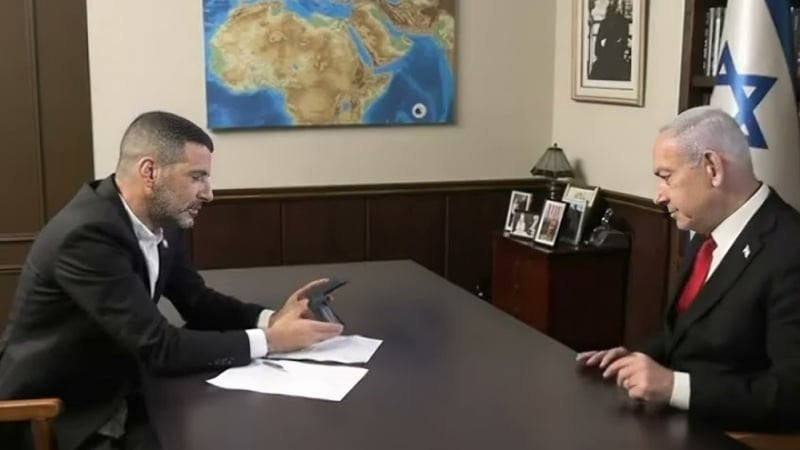Warning to the Arab world: The “Greater Israel” dream; A bomb Netanyahu has detonated
-

Israeli regime’s “i24” channel with Benjamin Netanyahu, the prime minister of the regime
Pars Today – A political analyst has warned Arab countries about the “Greater Israel” dream of the Israeli regime’s prime minister.
Benjamin Netanyahu, the prime minister of the Israeli regime, recently claimed in an interview with Sharon Gal on the Israeli regime’s “i24” channel: “I am on a historic and spiritual mission and am emotionally connected to the dream of a Greater Israel.”
According to Pars Today, Abdullah Ma’arouf, a Palestinian writer and West Asia affairs analyst, warned Arab countries about the implications of Netanyahu’s statements regarding the “Greater Israel” dream. On Wednesday, Ma’arouf wrote on Al Jazeera’s website: “These remarks cannot be analyzed in isolation from the circumstances in which they were made.”
The journalist interviewing Netanyahu, Sharon Gal, is a well-known presenter and a former Knesset member from the right-wing “Yisrael Beiteinu” party led by Avigdor Lieberman. During the interview, Sharon Gal presented Netanyahu with a gift that, according to him, reflected one of his lifelong wishes: a map of the “Promised Land.”
Ma’arouf added that the gift was the same type of necklace carried by supporters of the far-right, engraved with the map of “Greater Israel,” or the so-called “Promised Land” — a territory stretching from the Nile to the Euphrates. While presenting the gift, Gal asked Netanyahu: “Do you believe in this vision?” — referring to the concept of the “Promised Land” and “Greater Israel.” Netanyahu replied twice in succession: “Absolutely.”
The writer believes that two possibilities can be considered regarding this matter.
The first possibility is that Netanyahu and Sharon Gal had fully agreed in advance on the interview scenario so that Netanyahu could reveal his new inclinations in such a way that it would not appear deliberate. Such behavior would not be unusual for someone like Netanyahu, who is known for political maneuvering. In this case, he sought to present himself in the interview as someone who, for the first time, was honestly expressing his inner beliefs. This approach could serve as a means to gain even greater support from the religious Zionist movement, particularly in connection with his assaults on Gaza.
The second possibility is that Netanyahu truly did not expect such a question and found himself in a situation where he had to choose between two images: a secular image, by which his party and cabinet are generally known, or a religious, biblical image — one that today is voiced more loudly by right-wing religious movements, particularly religious Zionism.
According to Ma’arouf, Netanyahu is well known for his skill in avoiding uncomfortable situations and steering clear of controversial statements about the “Greater Israel” dream and other sensitive issues. He has consistently distanced himself from the inflammatory remarks of his cabinet members from the religious Zionist movement, such as Bezalel Smotrich and Itamar Ben-Gvir — statements that revolve around themes like controlling Al-Aqsa Mosque, annexing the West Bank, and exerting dominance over Jordan, Lebanon, Egypt, and Syria.
This time, faced with Sharon Gal’s “gift,” which was directly linked to the idea of “Greater Israel,” Netanyahu had only two options: either maneuver and evade in order to preserve the secular image of Israel — a source of pride for Zionists since the time of Ben-Gurion — or seize the opportunity to make this interview a turning point for openly declaring his full alignment with the religious Zionist vision. This vision is rooted in the Torah’s narrative, which the movement regards as the foundation for the future of the Israeli regime.
In his view, Netanyahu chose the second path, openly siding with the religious narrative supported by the religious Zionist movement, thereby making himself its newest member within the Likud Party. Netanyahu was fully aware of the weight of his words and spoke each term with intent. He knew that the term “Greater Israel” or “Promised Land” encompasses territories belonging to countries with which Israel has long taken pride in maintaining diplomatic relations — especially Jordan and Egypt, which have peace treaties with Israel, as well as parts of Saudi Arabia, with which Netanyahu has repeatedly spoken of his efforts to establish relations. This also includes Lebanon, Syria, and Iraq. Therefore, his open adherence to this vision amounts to declaring a break from any prior commitments by Israel, whether toward regional countries or the wider world.
The writer warned that it is now the duty of the region’s official states to treat these remarks as a new and official policy direction for Israel — one no longer confined to figures like Smotrich and Ben-Gvir. This openly hostile stance toward neighboring Arab countries demands a serious response before its scope expands further — a response that must go beyond condemnations and political or media statements, and instead translate into real action on the ground.
In his view, the first and most important step is to challenge Israel’s position through a united Arab and Islamic front, and the only issue capable of shifting this equation is breaking the siege of Gaza. However, if the Arab world’s weak and muted stance remains unchanged, Netanyahu will only push forward even further.